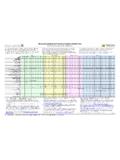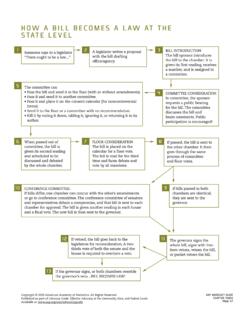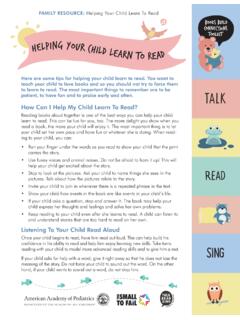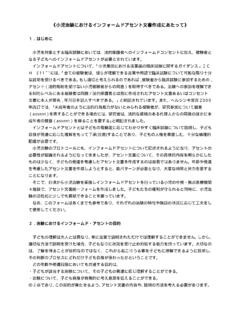Transcription of Session 3. Informed Consent and Assent in Clinical Pediatrics
1 American Academy of Pediatrics Bioethics Resident Curriculum: Case-Based Teaching Guides Session 3. Informed Consent and Assent in Clinical Pediatrics Yoram Unguru, MD, MS, MA. Overview Decision making in Pediatrics presents a multitude of challenges for children, parents, and physicians alike. The related, yet distinct, concepts of Assent and Consent are central to pediatric decision making. Although Informed Consent is largely accepted as a worthwhile principle in adult medicine, Assent has been, and continues to be, mired in controversy. Unanswered questions include the actual definition of Assent , how old a child should be to provide meaningful Assent , who should be involved in the Assent process, how to resolve disputes between children and their parents, the relationship between Assent and Consent , the quantity and quality of information to disclose to children and their families, how much and what information children desire and need, the necessity and methods for assessing both children's understanding of disclosed information and of the Assent process itself, and finally, what constitutes an effective, practical, and realistically applicable decision-making model.
2 Instructors Guide: Case Summary Alternative Cases Learning Objectives Suggested Reading for Instructor Further Reading Case Discussion Conclusions and Suggestions Case Summary Josh, a 17-year-old, has had Crohn's disease for 5 years. Since diagnosis, Josh has had 3. flares, each manifesting with abdominal pain, bloating, oral intolerance, and intermittently bloody diarrhea. Flares have successfully been treated with mesalamine and corticosteroids. Josh had been adherent with maintenance medication (6- mercaptopurine) and with his treatment regimen until 3 months ago, when he joined the varsity basketball team. He no longer takes his medication regularly and he argues with his parents about his recent weight loss and abdominal symptoms. Josh's mother reports that he minimizes his symptoms so that he can continue to play sports.
3 Josh says he just wants to be a normal kid. He does not think he needs any chronic medications to 17. control his disease and asks that you respect his decision. As Josh's physician, is this a decision you will allow him to make? How do you balance Josh's goals with those of his parents' and your own? How can you find a way to enable Josh's parents to allow him to transition into control of his own health care management? Who ultimately is responsible for Josh's care and health? How would this situation be different if Josh were 18 instead of 17? Alternative Cases 1. Kathy is a 13-year-old who presents to your continuity clinic for the second time with a sexually transmitted infection. During the course of obtaining a thorough medical history she relates that she has had consensual sex with many sexual partners. Additionally, she admits to a history of sexual abuse by her mother's former live-in boyfriend.
4 Kathy's mother does not know that she is sexually active and Kathy emphatically demands that you treat her without telling her mother. 2. David, a precocious 12-year-old, is seen in a local emergency department with acute onset nausea, vomiting, and scrotal pain and swelling. Testicular torsion is diagnosed. The emergency room physician informs David and his parents that surgical exploration is necessary to salvage the involved testis and that the pediatric surgeon is on her way. David is visibly upset. He is quite emphatic that no girl touches him down there. Additionally, he does not want a lifelong scar and is afraid it will (sexually) disadvantage him in the future. Despite his parents'. insistence that he go ahead with the surgery, David adamantly refuses. He states that forcing him to have surgery against his wishes is assault and he threatens to do whatever it takes, including physically resisting and calling a lawyer if necessary.
5 Learning Objectives 1. Understand the components of Assent and how it differs from Informed Consent or permission. 2. Identify the requirements necessary for a child to possess decision-making capacity and barriers that may influence a child's ability to participate in decisions. 3. Recognize limitations on children's decision-making rights as well as specific circumstances in which minors are the primary decision makers related to their care. 4. Discuss approaches to balance disputes when children and parents' preference conflict with one another. 5. Articulate a practical decision-making model that portrays Assent as a process and establishes appropriate roles for children, their parents, and physicians. 18. Suggested Reading for Instructor Erlen JA. The child's choice: an essential component in treatment decisions.
6 Child Health Care. 1987;15(3):156-160. American Academy of Pediatrics , Committee on Bioethics. Informed Consent , parental permission, and Assent in pediatric practice. Pediatrics 1995;95(2):314-317. Steinberg L. Does recent research on adolescent brain development inform the mature minor doctrine? J Med Philos. 2013;38(3):256-267. Bartholome WG. Ethical issues in pediatric research. In: Vanderpool HY, ed. The Ethics of Research Involving Human Subjects. Frederick, MD: University Publishing Group;. 1996:339-370. Bluebond-Langer M, DeCicco A, Belsco J. Involving children with life-shortening illnesses in decisions about participation in Clinical research: a proposal for shuttle diplomacy and negotiation. In: Kodish E, ed. Ethics and Research with Children: A Case- Based Approach. New York, NY: Oxford University Press; 2005:336.
7 Further Reading National Commission for the Protection of Human Subjects of Biomedical and Behavioral Research. Research involving children: report and recommendations of the National Commission for Human Subjects of Biomedical and Behavioral Research. Federal Register. 1978a;43(9):2084-2114. Spinetta JJ, Masera G, Jankovic M, et al. Valid Informed Consent and participative decision-making in children with cancer and their parents: a report of the SIOP working committee on psychosocial issues in pediatric oncology. Med Pediatr Oncol. 2003;40(4):244-246. Unguru Y, Coppes MJ, Kamani, N. Rethinking pediatric Assent : from requirement to ideal. Pediatr Clin North Am. 2008;55(1):211-222. Geller G, Tambor ES, Berhardt BA, Fraser G, Wissow LS. Informed Consent for enrolling minors in genetic susceptibility research: a qualitative study of at-risk children's and parent's views about children's role in decision-making.
8 J Adolesc Health. 2003;32(4):260-271. Grady C, Wiener L, Abdoler E, et al. Assent in research: the voices of adolescents. J. Adolesc Health. 2014;54(5):515-520. Weithorn LA, Campbell SR. The competency of children and adolescents to make Informed treatment decisions. Child Dev. 1982;53(6):1589-1598. 19. Hein IM, Troost PW, Lindeboom R, et al. Accuracy of the MacArthur competence assessment tool for Clinical research (MacCAT-CR) for measuring children's competence to Consent to Clinical research. JAMA Pediatr. 2014;168(12):1147-1153. Hein IM, Troost PW, Lindeboom R, et al. Key factors in children's competence to Consent to Clinical research. BMC Med Ethics. 2015;16(1):74. Cardwell v Bechtol, 724 2d 739 (Tenn 1987). Collogan LK, Fleischman AR. Adolescent research and parental permission. In: Kodish E, ed. Ethics and Research with Children: A Case-Based Approach.
9 New York, NY: Oxford University Press; 2005;87. Diekema D. Adolescent refusal of lifesaving treatment: are we asking the right questions? Adolesc Med. 2011;22(2):213-228. Partridge B. The mature minor: some critical psychological reflections on the empirical bases. J Med Philos. 2013;38(3):283-299. American Psychological Association. Amicus Curiae brief in Miller v Alabama and Jackson v Hobbs. American Psychological Association; 2012. Available at: Accessed June 13, 2016. Partridge B. Adolescent pediatric decision-making: a critical reconsideration in the light of the data. HEC Forum 2014;26(4):299-308. Hein IM, Troost PW, Broersma A, et al. Why is it hard to make progress in assessing children's decision-making competence? BMC Med Ethics. 2015;16(1):1-6. Rossi WC, Reynolds W, Nelson RM. Child Assent and parental permission in pediatric research.
10 Theor Med. 2003;24(2):131-148. Unguru Y, Sill A, Kamani N. The experiences of children enrolled in pediatric oncology research: implications for Assent . Pediatrics . 2010;125(4):e876-e883. Piker A. Balancing liberation and protection: a moderate approach to adolescent health care decision-making. Bioethics. 2011;25(4):202-208. US Department of Health and Human Services. 45 CFR 46. Subpart D Additional Protections for Children Involved as Subjects in Research. Federal Register. 1983;48:9818. Cherry MJ. Ignoring the data and endangering children: why the mature minor standard for medical decision making must be abandoned. J Med Philos. 2013;38(3):315-331. 20. Coleman DL, Rosoff PM. The legal authority of mature minors to Consent to general medical treatment. Pediatrics . 2013;131(4):786-793. Cooley WC, Sagerman PJ; American Academy of Pediatrics , American Academy of Family Physicians, and American College of Physicians, Transitions Clinical Report Authoring Group.













